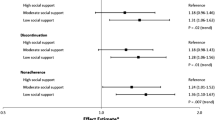Abstract
Background: Although considerable attention has been directed toward cancer support groups, little is known about how often these services are actually used in clinical practice or the factors that influence participation. Purpose: Drawing in part on the Health Belief Model, this study examined group participation and its correlates among 425 patients with diverse malignancies treated at a large academic oncology center. Method: Patients were surveyed regarding utilization rates, health beliefs, and medical and demographic characteristics. Results: Only a small number of patients reported having participated in groups (8.0%). Consistent with the model, in univariate analyses, participation was significantly related to greater perceptions of illness severity (p < .0001), greater perceived benefits (p < .01), fewer perceived barriers (all p < .01), and greater cues for action (i.e., recommendation by family/friends, p < .000001). In multivariate analyses controlling for disease site and other covariates, the strongest predictors included recommendation by family/friends (OR = 5.04; CI = 1.98–12.81), perceived seriousness of the illness (OR = 4.07; CI = 1.42–11.60), and geographical residence (OR = 2.74; CI = 1.09–6.93). Conclusion: Results suggest that participation might be increased by involving the patient’s support network, improving access in underserved rural communities, addressing illness appraisals, and increasing outreach to certain diagnostic groups.
Similar content being viewed by others
References
Aday, L.A., & Anderson, R. (1974). A framework for the study of access to medical care. Health Services Research, 9, 208–220.
Andersen, B. L. (2002). Biobehavioral outcomes following psychological interventions for cancer patients. Journal of Consulting and Clinical Psychology, 70, 590–610
Andrykowski, M. A., & Manne, S. L. (2006). Are psychological interventions effective and accepted by cancer patients? I. Standards and levels of evidence. Annals of Behavioral Medicine, 32, 93–97.
Ajzen, I., & Fishbein, M. (1980). Understanding attitudes and predicting social behavior. Englewood Cliffs, NJ: Prentice Hall.
Bauman, L. J., Gervey, R., & Siegel, K. (1992). Factors associated with cancer patients’ participation in support groups. Journal of Psychosocial Oncology, 10, 1–20.
Berglund, B., Bolund, C., Gustafsson, U. L., & Sjoden, P.O. (1997). Is the wish to participate in a cancer rehabilitation program an indicator of the need? Comparisons of participants and non- participants in a randomized study. Psycho-Oncology, 6,35–46.
Bos-Branolte, G., Zielstra, E. M., & Rijshouwer, Y.M., Duivenvoorden, H. J. (1988). Psychotherapy in patients cured of gynecological cancers. Recent Results in Cancer Research, 108, 277–288.
Boyd-Franklin, N. (1991). Recurrent themes in the treatment of African-American women in group psychotherapy. Women and Therapy, 11, 25–40.
Cameron, L. D., Booth, R. J., Schlatter, M., Ziginskas, D., Harman, J. E., & Benson, S. R. C. (2005). Cognitive and affective determinants of decisions to attend a group psychosocial support program for women with breast cancer. Psychosomatic Medicine, 67, 584–589.
Cella, D. F., & Yellen, S. B. (1993). Cancer support groups: The state of the art. Cancer Practice, 1, 56–61.
Cunningham, A., & Edmonds, C. V. I. (1996). Group psychological therapy for cancer patients: A point of view, and discussion of the hierarchy of options. International Journal of Psychiatry and Medicine, 26, 51–82.
Deans, G., Bennett-Emslie, G. B., Weir, J., Smith, D. C., & Kaye, S.B. (1988). Cancer support groupsflWho joins and why? British Journal of Cancer, 58, 670–674.
Del Giudice, M. E., Leszcz, M., Pritchard, K., Vincent, L., & Goodwin, P. (1997). Attitudes of Canadian oncology practitioners toward psychosocial intervention in clinical and research settings in women with breast cancer. Psycho-Oncology, 6,178–189.
Duncan, J. A., & Cumbia, G. G. (1987). Lessons learned while providing group counseling for adult patients with metastatic cancer. Journal for Specialists in Group Work, 12, 70–75.
Eakin, E. G., & Strycker, L. A. (2001). Awareness and barriers to use of cancer support and information resources by HMO patients with breast, prostate, or colon cancer: Patient and provider perspectives. Psycho-Oncology, 10, 103–113.
Edgar, L., Remmer, J., Rosberger, Z., & Fournier, M. A. (2000). Resource use in women completing treatment for breast cancer. Psycho-Oncology, 9, 428–438.
Fawzy, F. I., & Fawzy, N. W. (1998). Group therapy in the cancer setting. Journal of Psychosomatic Research, 45, 191–200.
Fukui, S., Kugaya, A., Kamiya, M., Koike, M., Okamura, H., & Nakanishi, T., et al. (2001). Participation in psychosocial group intervention among Japanese women with primary breast cancer and its associated factors. Psycho-Oncology, 10, 419–427.
Gilbar, O., & Neuman, R. (2002). Which cancer patient completes a psychosocial intervention program? Psycho-Oncology, 11, 461–471.
Gray, R. E., Carroll, J. C., Fitch, M., Greenberg, M., Chart, P., & Orr, V. (1999). Cancer self-help groups and family physicians. Family Practice, 7, 10–15.
Guidry, J. J., Aday, L. A., Zhang, D., & Winn, R. J. (1997). The role of informal and formal support networks for patients with cancer. Cancer Practice, 5, 2421–2246.
Helgeson, V. S., Cohen, S., Schulz, R., & Yasko, J. (2000). Group support interventions for women with breast cancer: Who benefits from what? Health Psychology, 19, 107–114.
Hitch, P. J., Fielding, R. G., & Llewelyn, S. P. (1994). Effectiveness of self-help and support groups for cancer patients: A review. Psychology and Health, 9, 437–448.
Krizek, C., Roberts, C., Ragan, R., Ferrara, J. J., & Lord, B. (1999). Gender and cancer support group participation. Cancer Practice, 7, 86–92.
Krupnick, J. L., Rowland, J. H., Goldberg, R. L., & Daniel, U. V. (1993). Professionally led support groups for cancer patients: An intervention in search of a model. International Journal of Psychiatry and Medicine, 23, 275–294.
Lane, D. S., Zapka, J., Breen, N., Messina, C. R., & Fotheringham, D. J. (2000). A systems model of clinical preventive care: The case of breast cancer screening among older women. Preventive Medicine, 31, 481–493.
Lauver, D. (1992). A theory of care-seeking behavior. Image, 24, 265–271.
Lepore, S. J., & Coyne, J. C. (2006). Psychological interventions for distress in cancer patients: A review of reviews. Annals of Behavioral Medicine, 32, 85–92.
Leszcz, M., Sherman, A. C., Mosier, J., Burlingame, G. M., Cleary, T., Ulman, K. U., et al. (2004). Group interventions for patients with cancer and HIV disease: Part IV. Clinical and policy recommendations. International Journal of Group Psychotherapy, 54, 539–556.
Lieberman, M. A., Golant, M., Giese-Davis, J., Winzlenberg, A., Benjamin, H., Humphreys, K., et al. (2003). Electronic support groups for breast carcinoma: A clinical trial of effectiveness. Cancer, 97, 920–925.
Llewelyn, S. P., Murray, A. K., Johnston, M., Johnston, D. W., Preece, P. E., & Dewer, J. A. (1999). Group therapy for metastatic cancer patients: Report of an intervention. Psychology, Health and Medicine, 4, 229–240.
Mathews, H. F., Lannin, D. R., & Mitchell, J. P. (1994). Coming to terms with advanced breast cancer: Black women’s narratives from eastern North Carolina. Social Science and Medicine, 38, 789–800.
McFarland, C., & Alvaro, C. (2000). The impact of motivation on temporal comparisons: Coping with traumatic events by perceiving personal growth. Journal of Personality and Social Psychology, 79, 327–343.
Meyer, T. J., & Mark, M. M. (1995). Effects of psychosocial interventions with adult cancer patients: A meta-analysis of randomized experiments. Health Psychology, 14, 101–108.
Newell, S. A., Sanson-Fisher, R. W., & Savolainen, N.J. (2002). Systematic review of psychological therapies for cancer patients and recommendations for future research. Journal of the National Cancer Institute 94, 558–584.
Pascoe, S., Edelman, S., & Kidman, A. (2000). Prevalence of psychological distress and the use of support services by cancer patients at Sydney hospitals. Australian and New Zealand Journal of Psychiatry, 34,785–791.
Plass, A., & Koch, U. (2001). Participation of oncological outpatients in psychosocial support. Psycho-Oncology, 10, 511–520.
Rosenstock, I. M. (1974). Historical origins of the health belief model. Health Education Monographs, 2, 328–335.
Sheard, T., & Maguire, P. (1999). The effect of psychological interventions on anxiety and depression in cancer patients: Results of two meta-analyses. British Journal of Cancer, 80, 1770–1780.
Sherman, A. C., Mosier, J., Leszcz, M., Burlingame, G. M., Ulman, K. U., Cleary, T., et al. (2004). Group interventions for patients with cancer and HIV disease: Part I. Effects on psychosocial and functional outcomes at different phases of illness. International Journal of Group Psychotherapy, 54, 29–82.
Sherman, A. C., Leszcz, M., Mosier, J., Burlingame, G. M., Cleary, T., Ulman, K. U., et al. (2004). Group interventions for patients with cancer and HIV disease: Part II. Effects on immune, endocrine, and disease outcomes at different phases of illness. International Journal of Group Psychotherapy, 54,203–233.
Sherman, A. C., Pennington, J., Latif, U., Farley, H., Arent, L., & Simonton, S. (2007). Patient preferences regarding group interventions: A view from the inside. Psychosomatics, 48,426–432.
Simonton, S., Sherman, A., Adams, D., & Fowler, J. (2000). Barriers to support services for cancer patients. Annals of Behavioral Medicine, 22(Suppl.), S196.
Skinner, C. S., Strecher, V. H., & Hospers, H. (1994). Physicians’ recommendations for mammography: Do tailored messages make a difference? American Journal of Public Health, 84,43–49.
Stevens, M. J., & Duttlinger, J. E. (1998). Correlates of participation in a breast cancer support group. Journal of Psychosomatic Research, 45, 263–275.
Stretcher, V. S., & Rosenstock, I. M. (1997). The health belief model. In K. Glanz, F. M. Lewis, & B. K. Rimer (Eds.), Health behaviors and health education: Theory, research and practice (pp. 41–59).San Francisco: Jossey-Bass.
Taylor, S., Falke, R., Shoptaw, S., & Lichtman, R. (1986). Social support, support groups, and the cancer patient. Journal of Consulting and Clinical Psychology, 54, 608–615.
Thiel de Bocanegra, H. (1992). Cancer patient’s interest in group support programs. Cancer Nursing, 15, 347–353.
Author information
Authors and Affiliations
Corresponding author
Rights and permissions
About this article
Cite this article
Sherman, A.C., Pennington, J., Simonton, S. et al. Determinants of participation in cancer support groups: The role of health beliefs. Int. J. Behav. Med. 15, 92–100 (2008). https://doi.org/10.1080/10705500801929601
Issue Date:
DOI: https://doi.org/10.1080/10705500801929601



